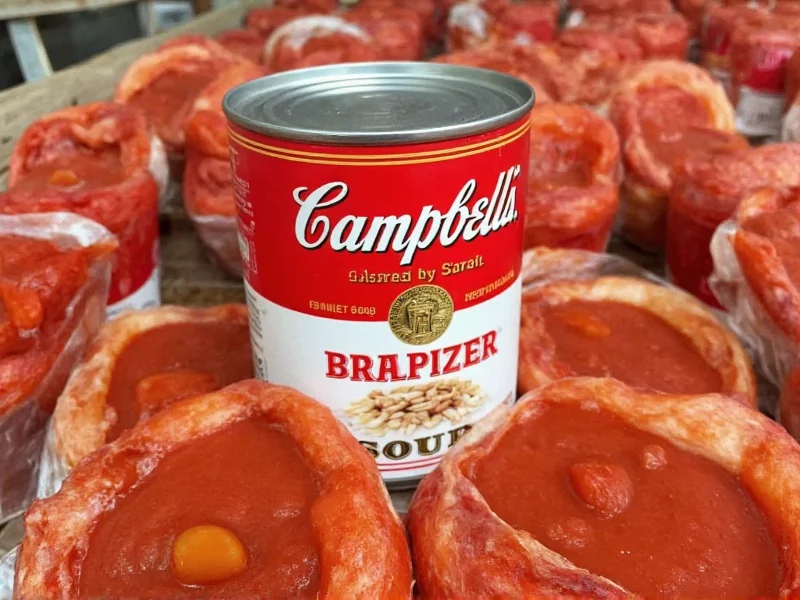| Top Institutional Shareholders | Approximate Ownership | Number of Shares Held |
|---|---|---|
| The Vanguard Group | 8.2% | 25.7 million |
| BlackRock | 7.9% | 24.8 million |
| State Street Corporation | 6.3% | 19.8 million |
| Berkshire Hathaway | 3.1% | 9.7 million |
| Fidelity Investments | 2.8% | 8.8 million |
Historical Ownership Timeline
Founded in 1869 by Joseph Campbell and Abraham Anderson, Campbell Soup began as a partnership producing canned vegetables and fruits. The company incorporated in 1891 as the Joseph Campbell Preserve Company. In 1922, Campbell Soup completed its initial public offering, transitioning from private ownership to a publicly traded company. This pivotal moment established the shareholder ownership model that continues today.
Throughout its history, Campbell Soup has maintained independence while expanding through strategic acquisitions. The company acquired Pace Foods in 1995, Snyder's-Lance in 2018, and most recently Sovos Brands in 2023. These acquisitions expanded Campbell's portfolio but didn't alter its fundamental ownership structure as a publicly traded entity.
Current Corporate Governance
Muktesh "Micky" Pant currently serves as President and CEO of Campbell Soup Company, leading the organization's strategic direction. The Board of Directors, consisting of 10 members including Pant, oversees corporate governance and represents shareholder interests. Board members include experienced executives from various industries, ensuring diverse perspectives on company strategy.
Campbell Soup operates through three primary business segments: Meals & Beverages, Snacks, and International. The Snacks segment, which includes well-known brands like Goldfish and Pepperidge Farm, now represents the largest portion of the company's revenue following strategic portfolio adjustments in recent years.
Shareholder Information
Investors can purchase Campbell Soup stock through any major brokerage platform using the ticker symbol CPB. The company has maintained a consistent dividend policy since 1923, making it one of the S&P 500's dividend aristocrats with over 50 consecutive years of dividend increases. Current dividend yield sits around 3.5%, reflecting the company's commitment to shareholder returns.
Annual shareholder meetings provide opportunities for owners to vote on corporate matters and engage with leadership. The most recent meeting featured discussions about sustainability initiatives, product innovation strategies, and long-term growth plans across Campbell's diverse brand portfolio.
Ownership Transparency
Campbell Soup maintains high transparency regarding ownership structure through regular SEC filings. Form 13F filings detail institutional ownership changes quarterly, while the annual 10-K report provides comprehensive information about major shareholders, executive compensation, and corporate governance practices.
For those researching who owns Campbell Soup company, the investor relations section of Campbell's corporate website offers the most current ownership data, including recent proxy statements that list shareholders owning more than 5% of outstanding stock. This level of disclosure meets regulatory requirements and supports investor confidence in the company's governance practices.
Who founded Campbell Soup Company?
Campbell Soup Company was founded in 1869 by Joseph Campbell, a fruit merchant, and Abraham Anderson, a commercial canner and packer. The partnership initially produced canned vegetables and fruits before focusing on soups, which became their signature product line.
Is Campbell Soup owned by another company?
No, Campbell Soup Company operates as an independent, publicly traded corporation (NYSE: CPB). It is not owned by another company but rather by its shareholders. While it has acquired numerous brands throughout its history, Campbell Soup itself remains a standalone publicly traded entity.
Who is the current CEO of Campbell Soup Company?
Muktesh "Micky" Pant serves as President and Chief Executive Officer of Campbell Soup Company. He assumed the CEO role in November 2024, bringing extensive consumer goods experience from previous leadership positions at Reckitt Benckiser and Mars, Incorporated.
How can I buy Campbell Soup stock?
You can purchase Campbell Soup Company stock (trading under NYSE: CPB) through any major brokerage platform. This includes online brokers like Fidelity, Charles Schwab, E......











 浙公网安备
33010002000092号
浙公网安备
33010002000092号 浙B2-20120091-4
浙B2-20120091-4